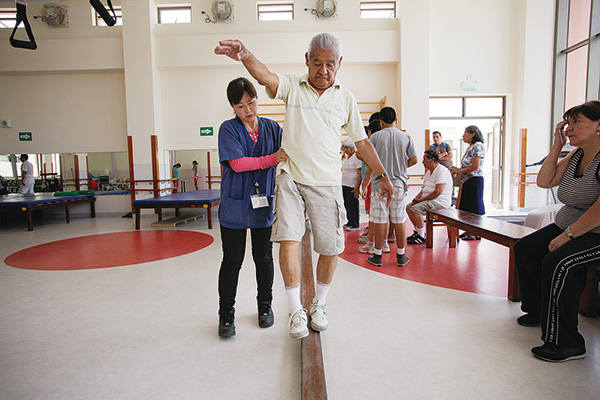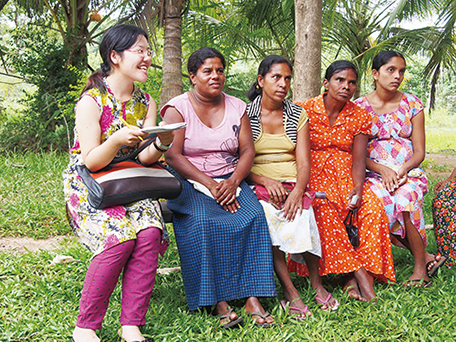Section 3 MDG Progress Status
3. Changes in the situation surrounding development

A JICA Senior Volunteer, Ms. Yoshie Hirota works as a physical therapist at the Instituto Nacional de Rehabilitación built with grant aid from Japan in Lima, Peru. (Photo: Kosuke Okahara / JICA)
The global situation surrounding development has changed remarkably in the 15 years since the MDGs were established. In this regard, it is essential to pay attention to the fact that new issues are emerging that cannot be tackled adequately by pursuing the MDGs alone.
An example is the issue of disparities. The MDGs are macro indicators that measure progress at the country level. Nonetheless, as is seen in Asian countries, on the flip side of economic growth, disparities widened between regions or between the social strata and income groups in some countries. It is becoming ever more important that efforts are made to ensure that people in vulnerable positions are not left behind in the country, such as women, children, persons with disabilities, the elderly, and refugees. Nevertheless, country-level MDGs failed to capture these intra-country disparities. Moreover, efforts that deal with issues not necessarily covered adequately by the MDGs have gained greater importance, including responses to the increasingly serious problems of environmental pollution and climate change as well as disaster risk reduction efforts for coping with frequent natural disasters.

A Japan Overseas Cooperation Volunteer, Ms. Yoko Miwa interviews local people regarding their requests in Rajanganaya, Sri Lanka. (Photo: Jiro Nakahara / JICA)
Recent years have also witnessed a diversification of development actors. With respect to financial flows to developing countries, private flows such as corporate investments are beginning to far exceed ODA amounts. This implies that it is becoming indispensable for governments and international organizations to partner with private companies to implement development cooperation. The role played by civil society, including NGOs, is expanding on various fronts, not only in the sites of development cooperation in developing countries, but also in recommending policies and raising awareness in developed countries. With some developing countries (emerging countries) developing rapidly, the existing “developed vs. developing country” dichotomy is losing its relevance. In the face of this situation, not only developed countries but all countries including emerging countries are called on to play their respective roles in development cooperation.
The “remaining challenges” of the MDGs that could not be achieved by 2015, as well as the newly emerging issues, have arisen as challenges that the international community must address beyond 2015. The question of how to deal with these challenges has been among the issues addressed as part of the countries’ discussions regarding the establishment of the international goals beyond 2015.
